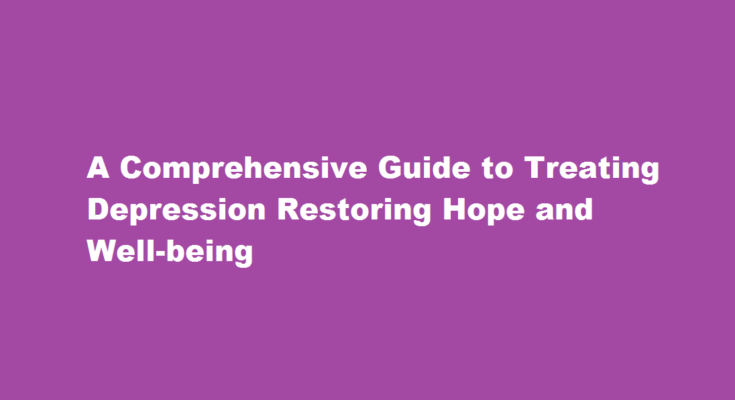Introduction
Depression is a debilitating mental health condition that affects millions of people worldwide. While seeking professional help is crucial, individuals can also take steps to treat depression and regain control over their lives. This article aims to provide a comprehensive guide on treating depression, encompassing various evidence-based strategies and self-care techniques. By understanding the multifaceted nature of depression and adopting a holistic approach, individuals can pave the way towards recovery, restoring hope, and enhancing overall well-being.
Understanding Depression
Depression is not merely feeling sad; it is a complex mental health disorder characterized by persistent feelings of sadness, hopelessness, and a loss of interest in previously enjoyed activities. It affects individuals emotionally, physically, and cognitively. While the exact causes of depression are still not fully understood, factors such as genetic predisposition, chemical imbalances in the brain, stressful life events, and certain medical conditions can contribute to its development.
Seeking Professional Help
The first step in treating depression involves seeking professional help. Mental health professionals, such as psychiatrists, psychologists, or therapists, are trained to diagnose and treat depression effectively. They will assess the severity of the condition, develop an individualized treatment plan, and may recommend therapies such as cognitive-behavioral therapy (CBT), interpersonal therapy (IPT), or medication.
Therapies for Depression
Cognitive-behavioral therapy (CBT) is a widely used therapeutic approach that helps individuals identify negative thought patterns and replace them with more positive and adaptive ones. Interpersonal therapy (IPT) focuses on improving relationships and resolving interpersonal conflicts that may contribute to depression. Other effective therapies include psychodynamic therapy, mindfulness-based cognitive therapy, and behavioral activation.
Medication and Alternative Treatments
In some cases, medication may be prescribed to manage depression. Antidepressant medications, such as selective serotonin reuptake inhibitors (SSRIs), serotonin-norepinephrine reuptake inhibitors (SNRIs), or tricyclic antidepressants (TCAs), can help balance brain chemistry. It is essential to work closely with a healthcare professional to find the most suitable medication and dosage. Additionally, alternative treatments like acupuncture, herbal supplements, and yoga have shown promising results in alleviating depressive symptoms, but more research is needed to establish their efficacy.
Lifestyle Changes
Making positive lifestyle changes can greatly impact one’s mental well-being. Engaging in regular physical exercise boosts mood, reduces stress, and promotes the release of endorphins. Prioritizing a healthy diet, including foods rich in omega-3 fatty acids, vitamins, and minerals, can support brain health. Sufficient sleep, stress management techniques, and social support are also essential for managing depression.
Self-Care and Coping Strategies
Self-care practices play a crucial role in treating depression. Engaging in activities that bring joy and relaxation, such as hobbies, art, or spending time in nature, can help combat depressive symptoms. Building a support network of friends and loved ones who can offer understanding and encouragement is vital. Practicing self-compassion, positive affirmations, and mindfulness techniques can foster a more positive mindset and aid in coping with depression.
FREQUENTLY ASKED QUESTIONS
What is the most common approach to treating depression?
Medications and psychotherapy are effective for most people with depression. Your primary care doctor or psychiatrist can prescribe medications to relieve symptoms. However, many people with depression also benefit from seeing a psychiatrist, psychologist or other mental health professional.
What is the first line of treatment for depression?
TREATMENT FOR MAJOR DEPRESSION — For the initial treatment of major depression, we suggest a combination of antidepressant medication and psychotherapy.
How do people overcome sadness?
ANS: Write in a journal, listen to music, spend time with friends or family, and/or draw to express the emotion sadness. Think about the context of the sad feelings. Are they related to a loss or an unhappy event? Think about the feelings in a non-judging way and ride the wave of the experience.
Conclusion
Treating depression requires a multifaceted approach that combines professional help, therapy, medication, lifestyle changes, and self-care strategies. Each individual’s journey to recovery may be different, and it is important to have patience and persistence. By seeking appropriate treatment, individuals can take control of their mental health, restore hope, and improve overall well-being. Remember, you are not alone in this battle, and there is always hope for a brighter future.
Read Also : The Art of Engaging Yourself in Studies Unlocking the Path to Academic Success



